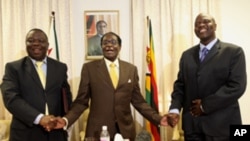Zimbabwean President Robert Mugabe said Monday that 22 months of power sharing by his ZANU-PF and the former opposition Movement for Democratic Change have given the country a "sense of togetherness," but his remarks came soon after his party resolved to end the unity government and press for new elections in 2011.
Meeting with his two unity government principals - Prime Minister Morgan Tsvangirai of the dominant MDC formation and Deputy Prime Minister Arthur Mutambara, leader of a rival MDC formation spun off in 2005 - President Mugabe said the unity government has made progress though its members have often been "at each others' throats."
His former ruling ZANU-PF resolved in conference on the weekend that the power-sharing arrangement should end in February after two years and that the nation should hold presidential and general elections next year as Mr. Mugabe has previously said.
Details of the meeting today at Zimbabwe House between Mr. Mugabe, Prime Minister Tsvangirai and Mutambara remained sketchy, though the issue of the elections was said to dominate talks. The three conceded as much in remarks after the meeting.
In a joint yearend news conference, Mr. Mugabe urged Zimbabweans not to engage in political violence as elections approach. The president said that “what we would want to get to our people is our voice and our command that there should be no violence, but that does not mean that everybody will listen to us."
He added that, “having found each other as Zimbabweans we had no option but to work together, today we have greater political stability than ever before, There is peace."
Mr. Tsvangirai called on the three leaders to preach peace and tolerance saying, "there are incidents of violence and we have witnessed it and we are committed as leaders to ensure that the next election is certainly not characterised by a culture of violence."
The demon of violence "must be ostracized," he said, "it is a demon that no one wants."
Analysts warn that early elections will undermine a fragile economic recovery and place in jeopardy the slim gains the government has made in terms of political reform.
Spokesman Nelson Chamisa of Mr. Tsvangirai's MDC formation said President Mugabe's position is not necessarily that of the entire inclusive government.
Edwin Mushoriwa, a spokesman for the Mutambara MDC formation criticized ZANU-PF saying that it it only interested in holding onto power by whatever means.
But ZANU-PF spokesman Rugare Gumbo says there is no going back on the party’s resolutions for dissolving the unity government and calling elections.
Political analyst Marian Tupy of the CATO Institute in Washington said ZANU-PF's drive for elections should benefit Mr. Mugabe and his party. He told VOA reporter Tatenda Gumbo that reforms needed for free and fair elections have not been implemented.
While the components of the unity government debate the question of elections next year, many across the country are fearful of the consequences.
Finance Minister Tendai Biti, secretary general of the Tsvangirai MDC formation, told party supporters in Kuwadzana, Harare, Sunday that ZANU-PF has deployed members of the army and police in rural areas to coerce the population ahead of elections.
Biti said ZANU-PF supporters have not spilt blood in two years and are eager to kill supporters of the MDC in the coming election period. Prime Minister Tsvangirai made similar accusations in a news conference in the capital late last week.
One resident of Zaka district, Masvingo province, requesting anonymity, told reporter Chris Gande that his community is in fear because of newly deployed soldiers.





